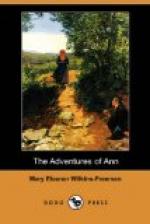As time wore on, it became evident that they stood in sore need of it. They had never had any children of their own, and Ann Ginnins was the first child who had ever lived with them. But she seemed to have the freaks of a dozen or more in herself, and they bade fair to have the experience of bringing up a whole troop with this one. They tried faithfully to do their duty by her, but they were not used to children, and she was a very hard child to manage. A whole legion of mischievous spirits seemed to dwell in her at times, and she became in a small and comparatively innocent way, the scandal of the staid Puritan neighborhood in which she lived. Yet, withal, she was so affectionate, and seemed to be actuated by so little real malice in any of her pranks, that people could not help having a sort of liking for the child, in spite of them.
She was quick to learn, and smart to work, too, when she chose. Sometimes she flew about with such alacrity that it seemed as if her little limbs were hung on wires, and no little girl in the neighborhood could do her daily tasks in the time she could, and they were no inconsiderable tasks, either.
Very soon after her arrival she was set to “winding quills,” so many every day. Seated at Mrs. Polly’s side, in her little homespun gown, winding quills through sunny forenoons—how she hated it! She liked feeding the hens and pigs better, and when she got promoted to driving the cows, a couple of years later, she was in her element. There were charming possibilities of nuts and checkerberries and sassafras and sweet flag all the way between the house and the pasture, and the chance to loiter, and have a romp.
She rarely showed any unwillingness to go for the cows; but once, when there was a quilting at her mistress’s house, she demurred. It was right in the midst of the festivities; they were just preparing for supper, in fact. Ann knew all about the good things in the pantry, she was wild with delight at the unwonted stir, and anxious not to lose a minute of it. She thought some one else might go for the cows that night. She cried and sulked, but there was no help for it. Go she had to. So she tucked up her gown—it was her best Sunday one—took her stick, and trudged along. When she came to the pasture, there were her master’s cows waiting at the bars. So were Neighbor Belcher’s cows also, in the adjoining pasture. Ann had her hand on the topmost of her own bars, when she happened to glance over at Neighbor Belcher’s, and a thought struck her. She burst into a peal of laughter, and took a step towards the other bars. Then she went back to her own. Finally, she let down the Belcher bars, and the Belcher cows crowded out, to the great astonishment of the Wales cows, who stared over their high rails and mooed uneasily.




